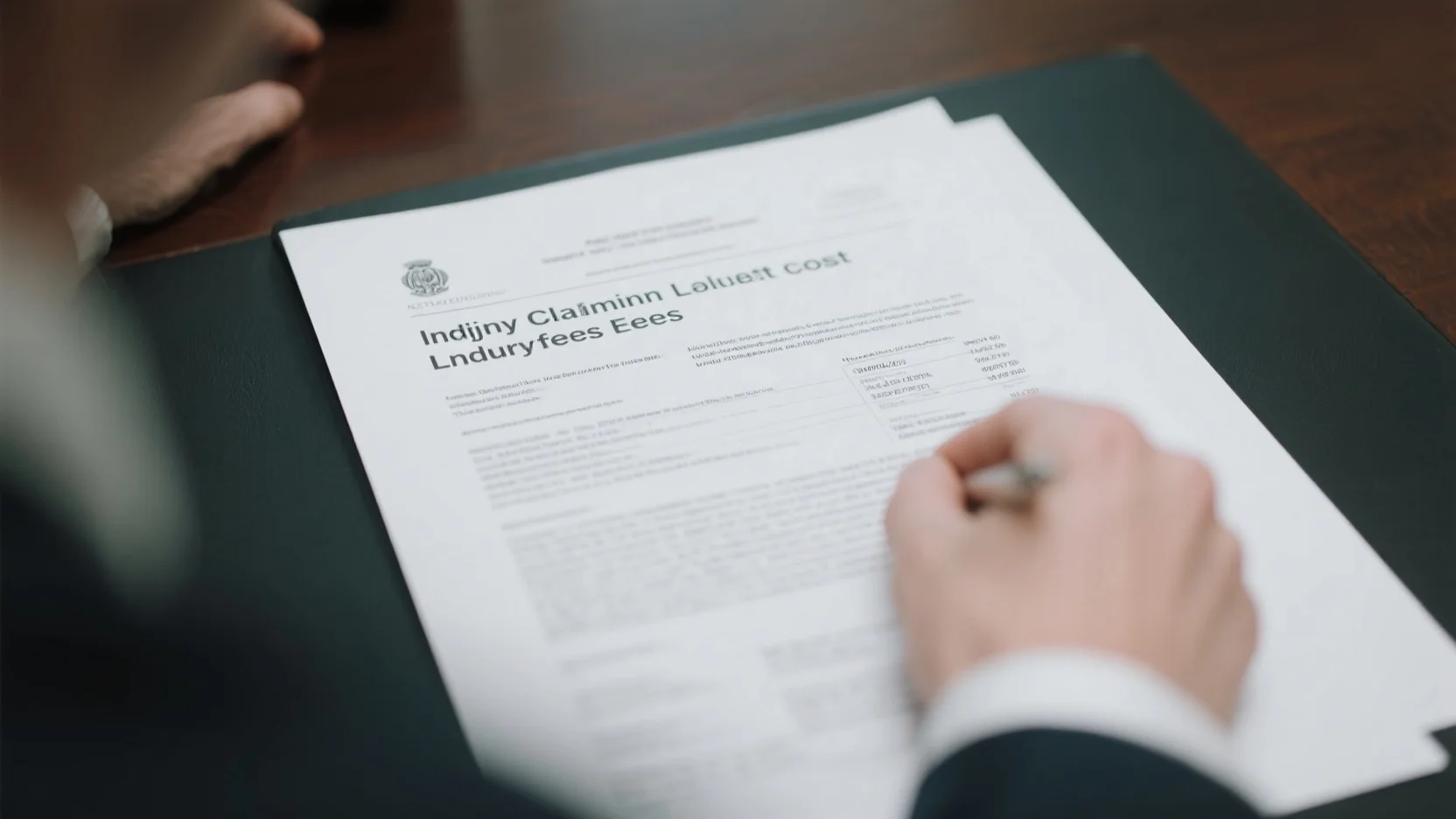
Image Source: pexels
When you hire a personal injury lawyer, they often utilize contingency fees, which means you only pay if you win your case. Most lawyers in the U.S. charge about 33% of the settlement, while some may charge up to 40%. This system is beneficial as it helps you avoid paying money upfront and shares the financial risks with the lawyer. By revealing and comparing lawyer fees in personal injury cases, you can see how these fees can vary. Lawyers are motivated to work hard to secure you a larger settlement because their pay depends on it. This shared goal fosters trust and ensures they remain focused on your case. Contingency fees make it possible for individuals to afford legal representation, even when facing formidable opponents.
Key Takeaways
- Contingency fees mean you pay your lawyer only if you win. This makes getting legal help easier for many people.
- Most personal injury lawyers take 33% to 40% of your settlement. Always ask about their exact percentage before hiring them.
- Watch out for extra costs like court fees or expert charges. These extra costs can add up fast.
- Think about the lawyer’s skill and reputation. A good lawyer might cost more but can get better results.
- Always ask for a written fee agreement. This helps you understand charges and avoid surprise costs.
Types of Lawyer Fees in Personal Injury Cases
When you hire a personal injury lawyer, you’ll see different ways they charge. Each method has its own advantages and works best in certain situations. Knowing these choices helps you decide wisely when looking at and comparing lawyer fees in personal injury cases.
Contingency Fees
Contingency fees are the most popular way lawyers charge in these cases. You don’t pay anything at the start. Instead, the lawyer takes a part of the money you win. This part is usually between 25% and 40%.
This method helps you avoid financial stress. You only pay if you win your case. Lawyers also work harder to get you more money since their pay depends on it.
| Fee Structure | Payment Model | Common Uses | Key Benefit |
|---|---|---|---|
| Contingency Fee | Percentage of awarded compensation on success | Personal injury, malpractice | No upfront cost, shared risk |
Hourly Rates
Some lawyers charge for every hour they work. This is less common in personal injury cases but still an option. On average, personal injury lawyers in the U.S. charge $51 per hour, with rates between $37 and $66.
Hourly rates let you see exactly what you’re paying for. But this can get costly, especially for complicated cases. Always ask about the estimated hours and total costs before agreeing to this type of fee.
Flat Fees
Flat fees mean you pay one set amount for the lawyer’s work. This is rare in personal injury cases but might be used for simple tasks like writing documents.
The biggest benefit of flat fees is knowing the cost upfront. You won’t be surprised by extra charges. However, if the case becomes more complicated, the lawyer might lose money.
| Fee Structure | Payment Model | Common Uses | Key Benefit |
|---|---|---|---|
| Flat Fee | Fixed cost regardless of time spent | Simple legal services (wills, trademarks) | Cost predictability |
By learning about these fee types, you can make better choices when comparing lawyer fees in personal injury cases.
Average Costs of Hiring a Personal Injury Lawyer
Typical Contingency Fee Percentages
Most personal injury lawyers use contingency fees for payment. These fees usually take 33% to 40% of your settlement. The American Bar Association says lawyers often charge about one-third. If your case ends before trial, the fee might be lower. But if it goes to trial, the fee is often higher due to extra work.
This system means you don’t pay anything upfront. It allows more people to afford a lawyer. Lawyers also work harder to win bigger settlements since their pay depends on it. When comparing lawyer fees, ask about their percentage and if it changes during the case.
Additional Costs and Expenses
Besides contingency fees, there are other costs in your case. These costs cover services needed to support your claim. For example, getting medical records can cost $40 to $60. More detailed treatments might cost up to $350. Reports from doctors, which prove injuries, can cost $500 to $2,000.
Other common costs include:
- Filing fees for court
- Fees for expert witnesses
- Office and admin costs
- Costs for depositions
- Investigation expenses
These costs can add up fast. Talk to your lawyer about them early. Knowing these costs helps you plan and avoid surprises. When comparing lawyer fees, think about both the contingency fee and extra costs for a full understanding.
Factors That Affect Lawyer Fees
Case Complexity
How complicated your case is affects lawyer fees. Cases with serious injuries or big damages need more work. For example:
- Collecting evidence like medical records or expert opinions costs more.
- Harder cases need skilled lawyers to get fair payments.
If your case has old injuries or unclear fault, it may take longer. Office costs also change. Simple cases might cost a few hundred dollars. Tougher cases can cost thousands. Strong proof, like videos or witnesses, helps you win. Weak proof can make it harder to get fair money.
Lawyer’s Experience and Reputation
A lawyer’s skill and reputation affect their fees a lot. Lawyers with lots of wins often charge more. They are better at handling tricky cases and getting good results. When choosing a lawyer, think about:
- Their focus on personal injury cases.
- How many cases they’ve won before.
- What past clients say about them.
Experienced lawyers cost more but can save time and get bigger payouts. Clear fees and good communication are key for a strong lawyer-client team.
Geographic Location
Where you live changes how much lawyers charge. City lawyers usually cost more because of higher demand. Rural lawyers may charge less but might lack special skills. For example:
- City lawyers face more competition, which raises prices.
- Rural lawyers charge less but may have fewer resources.
Knowing how location affects fees helps you choose wisely. Always weigh the cost against the lawyer’s quality and skills.
By thinking about these factors, you can compare lawyer fees better. This helps you find the best lawyer for your case.
How to Compare Lawyer Fees and Find the Best Value

Image Source: unsplash
Asking for Fee Agreements
Always ask for a written fee agreement from your lawyer. This paper explains how they charge and any extra costs. It helps you avoid surprises later. Ask clear questions to understand:
- How will I be charged?
- Are there any upfront payments?
- Do I owe money if we lose?
- Can you list all possible costs?
If the lawyer uses a contingency fee, you only pay if you win. This lowers your financial risk and makes hiring a lawyer easier. Also, ask if costs are taken out before or after their fee. This can change how much money you get.
Knowing Extra Costs
Personal injury cases often have other costs besides lawyer fees. These include court filing fees, expert witness charges, and medical record costs. Some lawyers pay these first and take them out later. Others might ask you to pay as the case goes on.
To avoid confusion, ask about these costs early. Questions like “What extra costs should I expect?” or “Will I pay for expert witnesses?” can help you plan. Knowing these details helps you prepare for all case expenses.
Looking at Value, Not Just Price
Price isn’t the only thing to think about when picking a lawyer. Value comes from the results they get and how they treat you. A lawyer who charges more but wins a bigger settlement may be worth it.
Think about their experience, reputation, and how they communicate. Do they focus on personal injury cases? Have they worked on cases like yours? Reviews from past clients can also show how good they are. The best lawyer gets you great results while keeping things simple and less stressful.
By focusing on these points, you can find the best lawyer for your case. Asking for fee agreements, knowing extra costs, and thinking about value will help you choose wisely.
Learning about lawyer fees in injury cases helps you choose wisely. Most lawyers use contingency fees, which are 25% to 40% of what you win. These fees depend on the case type and state rules.
| Case Type | Usual Fee Range | Important Details |
|---|---|---|
| Standard Injury Cases | 33-40% | Most popular fee setup |
| Medical Malpractice | 30-40% | May have limits set by states |
| Workers’ Compensation | 15-25% | Controlled by state regulations |
Things like how hard the case is, the lawyer’s skill, and where you live affect costs too. To get the best deal, compare fees, ask about extra charges, and check the lawyer’s success history. Always do your homework and ask questions to find the right lawyer for you.
FAQ
What is a contingency fee, and how does it work?
A contingency fee means you pay only if you win. The lawyer takes part of your settlement, usually 25% to 40%. This setup lowers your risk and pushes the lawyer to do their best.
Are there any upfront costs when hiring a personal injury lawyer?
Most lawyers using contingency fees don’t ask for upfront money. But you might still pay for things like court fees or expert help. Always ask about these costs before signing anything.
Can I negotiate a lawyer’s contingency fee percentage?
Yes, you can ask for a lower percentage. Some lawyers may agree, especially for simple cases. Talk about this during your first meeting. Make sure the final percentage is written in the agreement.
What happens if I lose my personal injury case?
If you lose, you usually don’t pay lawyer fees with contingency plans. But you might still owe for things like court or expert fees. Ask your lawyer about this before starting your case.
How can I ensure I choose the right lawyer for my case?
Find a lawyer with experience in cases like yours. Check reviews, their success rate, and reputation. Get a written fee agreement and ask about costs and plans. A good lawyer explains clearly and puts your needs first.


